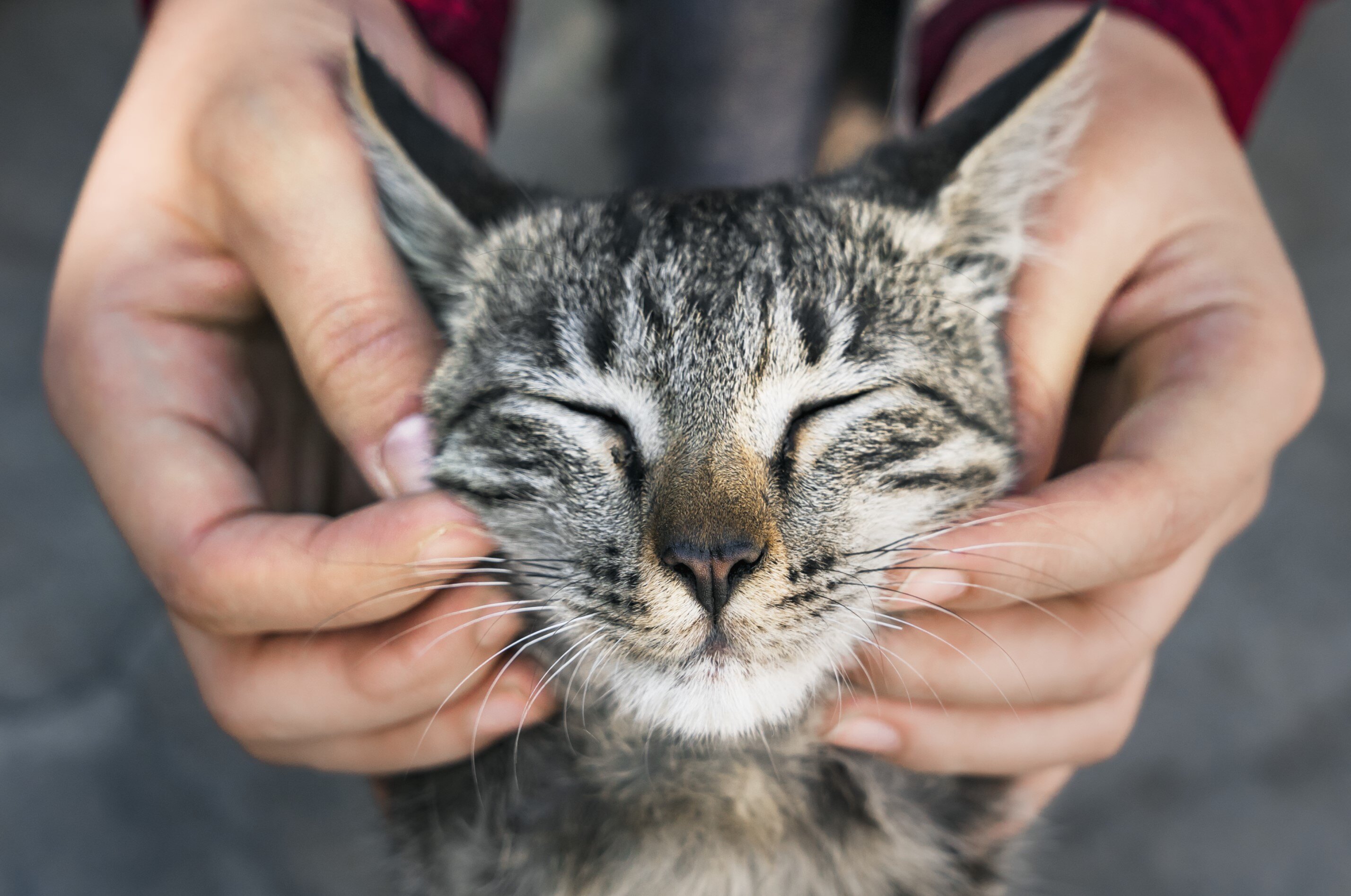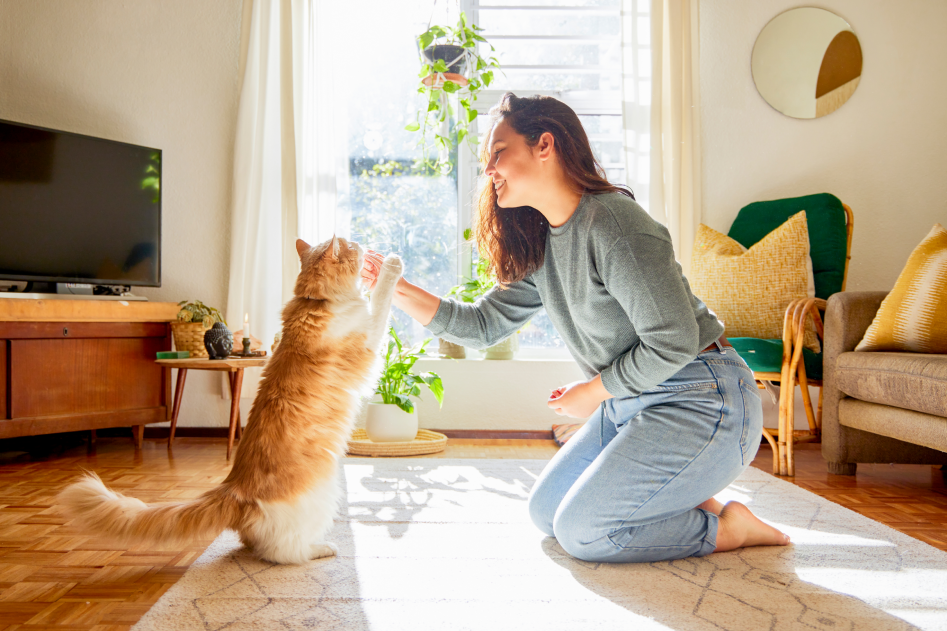
Social media is saturated with cute cat photos, funny cat videos, and cat-centric memes. But have you ever wondered why it’s cats in particular that seem to capture so much of the internet’s attention?
TELUS Health MyPet talked to veterinarian Dr. Janet Maclean to get her perspective on why cat pictures are so ubiquitous. Here is what she told us.
Why cats?
Cats aren’t usually show-offs, and indoor cats in particular don’t get too many opportunities to meet new people. Even if you visit a cat owner’s house, chances are the cat will make themselves scarce while you’re there. Social media is one of the only places where you get to see someone else’s cat acting like itself.
While there are certainly exceptions to the rule, cats tend to be pretty independent and do their own thing most of the time. They have an “air of mystery” that dogs don’t always have – at least not in the same way. Cats are both majestic and silly, and that dichotomy makes them all the more entertaining to watch.
There’s also the simple fact that cats are cute, and looking at images of cute things like babies and kittens has been shown to release stress-relieving hormones in humans. After a long day at work, looking at cat pictures or watching a video of a cute kitten can be just the thing you need to help you unwind.
Is there any downside to cats being so popular on social media?
While sharing a video of your cat sleeping peacefully or playing with a toy can be good, harmless fun, there can also be a less cat-friendly side to social media trends around pets.
One example is a video trend in which cat owners place a cucumber or zucchini on the floor next to their unsuspecting feline. Invariably, the cats jump and run away as soon as they notice the vegetable. While these clips may seem funny, the truth is that scaring or stressing out a cat for the sake of entertainment is never a good idea.
Your cat should feel safe and comfortable in their home environment. Purposely frightening cats can undermine their sense of safety, and lead to chronic stress and health issues.
Signs of stress in a cat can include:
- Flattened ears
- Hunched posture
- Wide eyes with dilated pupils
- Loud, distressed-sounding vocalizations
Another issue that can be seen on social media is the glorification of severely overweight cats and extreme breeding. An overweight cat may be cute, but obesity in cats can lead to many health issues, including joint pain, diabetes, low energy levels, and reduced quality of life.
Likewise, special breeds like munchkins, Scottish folds and sphynx cats draw lots of attention on social media but it’s important to be aware that this kind of selective breeding can severely impact a pet’s health and quality of life, in ways both visible and non-visible. Cats with stubby legs can’t run and jump in the same way that normal cats can, and this can make life more difficult for these naturally inquisitive, and normally quite athletic, creatures. Special breeds may also require additional care beyond the needs of a standard house cat – like sphynx cats which require regular baths and skin care.
On the other hand, there are many dedicated cat owners and caretakers who post wonderful, heart-warming content around fostering or rehabilitating cats with complex needs. As with any type of social media, it’s up to you to think critically about the content that you engage with.
How can cat posts on social media be beneficial?
Social media can be a great way for cat owners to share and form connections over their favourite pets. While dog owners have dog parks, cat owners don’t get too many opportunities to meet other cat lovers and their furry companions.
Many vet clinics are also getting in on the social media game, creating Instagram accounts and Facebook pages for their in-clinic cats. Sharing posts about clinic cats can actually be helpful in a few different ways. Sometimes clinic cats are surrendered due to chronic conditions, and it can be heartwarming and educational for families and pet owners to see these felines getting the care they need in a vet setting.
Sharing images of cuddly clinic cats can help the clinic seem more welcoming to patients and their owners. It can also boost morale for vets and vet techs to have a healthy, friendly cat to interact with as they care for sick and injured patients.
A clinic cat social account can even help to create a sense of community for a vet office, with clinic cats often becoming local sensations.
What are some things to consider when taking or posting cat pictures?
If you want to share photos of your cuddly kitty on social media, go for it! Just ensure that when you’re taking photos or capturing video, you’re doing so in a way that’s comfortable and unobtrusive for your pet. Film them in their natural environment, doing their natural activities, and avoid deliberately putting them in situations where they are uncomfortable.

Don’t video or photograph your cat while they’re eating or using the litter box. And don’t forget to interact with your cat regularly without a camera involved.
Think critically about the social media that you consume and what you put out there. Cats are complex creatures that require plenty of physical activity, attention and stimulation. They can be a big (but rewarding) responsibility. Sharing images of your cat playing and being active is a great way to keep things real online.–
Regular checkups at the vet can ensure your cat stays happy and healthy for years to come. Did you know that you can see a vet from your phone? Vets on the TELUS Health MyPet app can diagnose illnesses, prescribe medications, and provide nutritional and behavioural treatment plans1. Download the app for free to get started.
1. Not applicable to all cases. A veterinarian or veterinary technician may decide that an in-person visit is required to ensure your pet receives appropriate care. Most provinces require veterinarians and veterinary technicians to provide after-hours care. TELUS Health MyPet recommends seeing your regular veterinarian or veterinary technician first when possible. For those who do not currently have a regular veterinarian or veterinary technician, or when care is not accessible, we are here to support you and your pet. The TELUS Health MyPet veterinarians practicing in British Columbia are working in affiliation with Little Paws Animal Clinic in Richmond, B.C. TELUS Health MyPet connects users with veterinarians affiliated with the Pet Telemedicine Veterinary Care clinic in Ontario.
